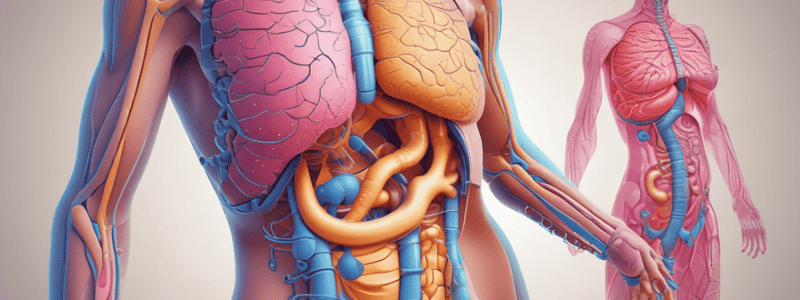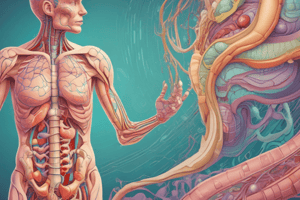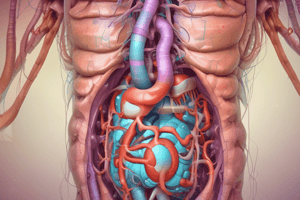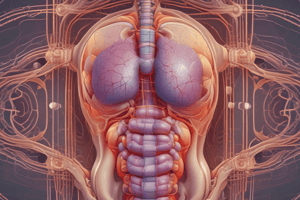Podcast
Questions and Answers
What is the primary function of retropulsion in the stomach?
What is the primary function of retropulsion in the stomach?
- To break down solid particles into smaller sizes (correct)
- To propel food into the duodenum
- To absorb nutrients into the bloodstream
- To mix food with digestive enzymes
What is the primary function of pepsin in the digestive process?
What is the primary function of pepsin in the digestive process?
- Absorption of vitamins
- Digestion of carbohydrates
- Initiation of protein digestion (correct)
- Neutralization of stomach acid
During which phase of gastric acid secretion is the majority of acid secreted?
During which phase of gastric acid secretion is the majority of acid secreted?
- Gastric phase (correct)
- Intestinal phase
- Basal phase
- Cephalic phase
Which of the following is NOT a factor influencing gastric juice secretion and HCl concentration?
Which of the following is NOT a factor influencing gastric juice secretion and HCl concentration?
What is the primary role of HCO3- in gastric acid secretion?
What is the primary role of HCO3- in gastric acid secretion?
What is the primary function of the gastric mucosal barrier?
What is the primary function of the gastric mucosal barrier?
What is the purpose of the tight junctions in the gastric mucosa?
What is the purpose of the tight junctions in the gastric mucosa?
Which of the following phases of acid secretion is triggered by the sight, smell, or thought of food?
Which of the following phases of acid secretion is triggered by the sight, smell, or thought of food?
What is the primary function of the mucus gel layer in the stomach?
What is the primary function of the mucus gel layer in the stomach?
What is the role of intrinsic factor in digestion?
What is the role of intrinsic factor in digestion?
What is the term for the phase of gastric acid secretion that occurs during fasting?
What is the term for the phase of gastric acid secretion that occurs during fasting?
Which of the following cells are responsible for the production of hydrochloric acid (HCl) in the stomach?
Which of the following cells are responsible for the production of hydrochloric acid (HCl) in the stomach?
What is the primary function of the tubulovesicles in the parietal cell?
What is the primary function of the tubulovesicles in the parietal cell?
How do parietal cells adapt functionally during HCl secretion?
How do parietal cells adapt functionally during HCl secretion?
What is the term for the process by which food is propelled into the duodenum?
What is the term for the process by which food is propelled into the duodenum?
What is the primary function of the gastric pits?
What is the primary function of the gastric pits?
What type of acid is released by the G-cell?
What type of acid is released by the G-cell?
What is the function of somatostatin in the regulation of G-cell function?
What is the function of somatostatin in the regulation of G-cell function?
What is the purpose of proton pump inhibitors in the treatment of acid reflux?
What is the purpose of proton pump inhibitors in the treatment of acid reflux?
What is the primary function of the ECL-cell in the regulation of G-cell function?
What is the primary function of the ECL-cell in the regulation of G-cell function?
What is the effect of gastrin on the stomach?
What is the effect of gastrin on the stomach?
What is the role of the D-cell in the regulation of G-cell function?
What is the role of the D-cell in the regulation of G-cell function?
What is the purpose of H2 antagonists, such as famotidine, in the treatment of acid reflux?
What is the purpose of H2 antagonists, such as famotidine, in the treatment of acid reflux?
What is the effect of gastrin-releasing peptide (GRP) on the G-cell?
What is the effect of gastrin-releasing peptide (GRP) on the G-cell?
Which gland is primarily responsible for the secretion of digestive enzymes in the oral cavity?
Which gland is primarily responsible for the secretion of digestive enzymes in the oral cavity?
What is the primary component of gastric juice that contributes to the acidic environment of the stomach?
What is the primary component of gastric juice that contributes to the acidic environment of the stomach?
Which phase of acid secretion is triggered by the sight or smell of food?
Which phase of acid secretion is triggered by the sight or smell of food?
What role does bicarbonate play in gastric secretion?
What role does bicarbonate play in gastric secretion?
Which hormone is particularly responsible for stimulating the secretion of pancreatic juice?
Which hormone is particularly responsible for stimulating the secretion of pancreatic juice?
Which factor does NOT influence gastric juice secretion?
Which factor does NOT influence gastric juice secretion?
Cholecystokinin is known to primarily influence which aspect of gastrointestinal physiology?
Cholecystokinin is known to primarily influence which aspect of gastrointestinal physiology?
Which component is NOT typically found in pancreatic juice?
Which component is NOT typically found in pancreatic juice?
Which receptors are involved in the stimulation of gastric acid secretion according to the three receptor model?
Which receptors are involved in the stimulation of gastric acid secretion according to the three receptor model?
What is the role of histamine in gastric acid secretion as per the provided models?
What is the role of histamine in gastric acid secretion as per the provided models?
Which cell type is identified in the model as responsible for the release of histamine?
Which cell type is identified in the model as responsible for the release of histamine?
What is the primary function of gastrin in the context of gastric acid secretion?
What is the primary function of gastrin in the context of gastric acid secretion?
Which two receptors are identified as being physiologically linked to the stimulation of gastric acid secretion?
Which two receptors are identified as being physiologically linked to the stimulation of gastric acid secretion?
In the context of the three receptor model, where does gastrin primarily act to stimulate the secretion of HCl?
In the context of the three receptor model, where does gastrin primarily act to stimulate the secretion of HCl?
Flashcards
Gastrointestinal System
Gastrointestinal System
The system encompassing organs and processes for nutrient digestion and absorption.
Salivary Glands
Salivary Glands
Glands that produce saliva containing enzymes to begin carbohydrate digestion and lubricate food.
Saliva Composition
Saliva Composition
A fluid containing mucins, electrolytes, and enzymes (like amylase and lysozyme).
Regulation of Salivary Secretion
Regulation of Salivary Secretion
Signup and view all the flashcards
Gastric Juice
Gastric Juice
Signup and view all the flashcards
Mucus and Bicarbonate
Mucus and Bicarbonate
Signup and view all the flashcards
Cephalic Phase
Cephalic Phase
Signup and view all the flashcards
Gastric Phase
Gastric Phase
Signup and view all the flashcards
Intestinal Phase
Intestinal Phase
Signup and view all the flashcards
Gastrin
Gastrin
Signup and view all the flashcards
Histamine
Histamine
Signup and view all the flashcards
Acetylcholine (ACh)
Acetylcholine (ACh)
Signup and view all the flashcards
Pancreatic Juice
Pancreatic Juice
Signup and view all the flashcards
Secretin and Cholecystokinin
Secretin and Cholecystokinin
Signup and view all the flashcards
Mucus Layer
Mucus Layer
Signup and view all the flashcards
Bicarbonate Secretion
Bicarbonate Secretion
Signup and view all the flashcards
Gastric Mucosa Blood Flow
Gastric Mucosa Blood Flow
Signup and view all the flashcards
Hyposalivation
Hyposalivation
Signup and view all the flashcards
Physiological Changes in Aging
Physiological Changes in Aging
Signup and view all the flashcards
Proton Pump Inhibitors (PPIs)
Proton Pump Inhibitors (PPIs)
Signup and view all the flashcards
H2 Antagonists
H2 Antagonists
Signup and view all the flashcards
Study Notes
Overview of Gastrointestinal System
- The digestive system includes various organs and processes for nutrient digestion and absorption.
- Key components of the digestive system include salivary glands, stomach, pancreas, and biliary system.
- Gut motility plays a significant role in the digestive process.
Salivary Secretions
- Salivary glands produce saliva, which contains enzymes that initiate carbohydrate digestion and lubricate food.
- Saliva composition includes mucins, electrolytes, enzymes (like amylase and lysozyme).
- Salivary secretion is regulated by autonomic nervous system, influenced by taste, smell, and sight.
Gastric Juice Secretion
- Gastric juice consists primarily of hydrochloric acid (HCl) and pepsin, aiding in protein digestion.
- Mucus and bicarbonate protect the gastric mucosa from acidic damage.
- Acid secretion occurs in three phases:
- Cephalic Phase: Triggered by sight, smell, or thought of food.
- Gastric Phase: Initiated by food presence, stretching stomach walls.
- Intestinal Phase: Hormonal response from the intestine (e.g., release of secretin and cholecystokinin).
Factors Influencing Gastric Acid Secretion
- Multiple factors that increase gastric acid secretion include:
- Gastrin from G cells in response to food.
- Histamine release from enterochromaffin-like (ECL) cells.
- Neurotransmitter acetylcholine (ACh) from vagus nerve stimulates acid production.
Pancreatic Secretions
- Pancreatic juice contains digestive enzymes (lipase, amylase, proteases) crucial for nutrient breakdown.
- Secretin and cholecystokinin are released into the bloodstream in response to the presence of fatty acids and amino acids, further stimulating pancreatic secretion.
Gastric Mucosal Defense Mechanisms
- A thick layer of mucus forms a protective barrier against gastric acid, preventing mucosal injury.
- Bicarbonate secretion neutralizes acid, maintaining a pH gradient across the gastric epithelium.
- Blood flow to the gastric mucosa supplies nutrients and delivers bicarbonate to help buffer acidity.
Physiological Changes in Aging
- Older adults may experience hyposalivation, leading to dry mouth and difficulty swallowing.
- Changes in receptor sensitivity and control mechanisms may affect the physiological regulation of digestion.
Implications of Acid Secretion Regulation
- Proton pump inhibitors (e.g., omeprazole) and H2 antagonists (e.g., famotidine) are used to manage excessive gastric acid conditions.
- Understanding gastric secretion mechanisms is critical for diagnosing and treating gastrointestinal disorders.
Studying That Suits You
Use AI to generate personalized quizzes and flashcards to suit your learning preferences.



